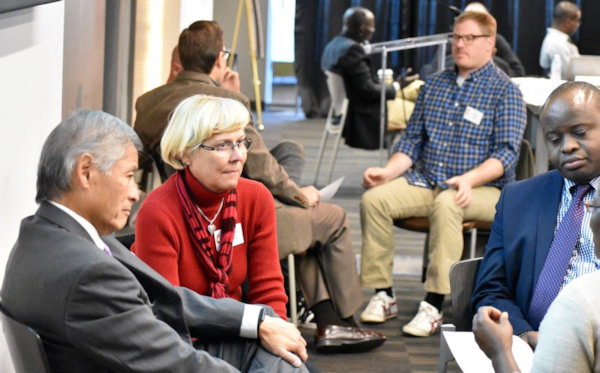Bishops Bruce Ough and Kenneth Carter answer questions about the Commission’s process in conference calls with communicators.
DOREEN GOSMIRE*
North Central Jurisdiction Communications
Oct. 30, 2017 | RAPID CITY, SD
North Central Jurisdiction communicators heard about the work of The Commission on A Way Forward last week through a videoconference session with Bishop Bruce R. Ough, president of the Council of Bishops and resident bishop of the Dakotas-Minnesota Area.
The Council of Bishops appointed the commission which has the task of trying to find a way through the denomination’s impasse around ministry with LGBTQ individuals. The Commission includes 32 members from nine countries.
Ough told communicators the work of the commission is ahead of schedule. The Council of Bishops (COB) will receive a preliminary report and give input to the Commission at the COB meeting November 4-6.
“The Council of Bishops instructed the Commission to develop a way forward that honors the mission of The United Methodist Church and maintains as much unity as possible,” said Ough. “The Commission has begun to identify what unites us. Even though there is a great diversity among us, a lot of branches, we all come from the same vine.”
Regulation has become a focus of the general focus of the church Ough noted. “There is a need to shift the pendulum from a focus on regulation to a focus on mission. We need to be explicit about what and how we are teaching. For the past couple of decades General Conferences have focused on regulations instead of how to live out our of mission.”
Communicators from the North Central Jurisdiction asked Ough about the impacts groups — like the Wesleyan Covenant Association, the United Methodists Association of Retired Clergy and the Uniting Methodist Movement — will have on the denomination and the work of the Commission. “It will be difficult, if not impossible, to keep everyone at the table. There may be one group that will leave regardless of the work of the Commission, Council of Bishop and the Church. The issues go beyond homosexuality and include the differences over fiscal matters, structure and biblical interpretations,” stated Ough.
The NCJ communicators joined a conference call with Bishop Kenneth Carter, Florida Area and one of three episcopal leaders who serve as commission moderators. Carter is also president-elect of the Council of Bishops.
“We are a group of leaders that have a desire for unity and want to move forward. Diversity and passion are present. Our struggle is trying to build something new. We have had feedback from every faction of the church,” said Carter.
The meetings of the Commission have been closed. Carter explained, “The closed sessions were necessary for us to do our work. The group needed to build trust and relationship with each other in order to do this work. Insanity is trying to do the same work, in the same way and expect different results. The model of The Way Forward is more like a diplomatic model. Diplomatic work happens behind the scenes in order to make it public. We are a body of the Council of Bishops.”
A covenant was formed by The Commission on A Way Forward as part of the process. “Matthew 18 holds us accountable. It is easy to get caught in the conformity of our world in terms of issues and polarity. The covenant has allowed us to have conversation about what unites us and defines the core values that we all share,” said Carter.
The team of 32 diverse individuals reflects the various factions of theology and beliefs around The United Methodist Church and homosexuality. Even though there are views that are in profound disagreement there is not division among the group. “Our work together on the commission has been shaped by Tom Berlin’s book, The Anatomy of Peace. We are in conversation about what we value and what unites us. John 15—the vine and the branches has provided a base where we see convergence and can move forward,” stated Bishop Carter.
Mission, unity and flexibility shape the models that the commission is developing. Carter explained, “We have spent a lot of time in the church focusing on regulating ourselves and shifted away from the mission of making disciples. We are focusing on the mission. The Commission has identified those things that we share in common, our core values we all hold. The commission also recognizes the need to have flexibility for the context of who we each are.”
The commission is meeting for the sixth time in Nashville on November 1 and will have three more meetings. After the November meeting, a picture and the conversation about the work will become more public. The commission will begin by sharing some models with the Council of Bishops. The council will then accept, modify or go back to work. July 1, 2018 is a deadline when any reports and recommendations will need to be available for consideration by the special General Conference called by Council of Bishops on February 23-26, 2019, in St. Louis, Missouri.
Bishop Carter shared, “I do see this work as generational. I do this work for people that are 30 years younger then us. I encourage you to reach out to people that are 30-40 years of age.”
For more information on the Commission on a Way Forward, visit their website, Facebook: www.facebook.com/umcforward Twitter: @UMCForward and Instagram: www.instagram.com/umcforward
*Gosmire is the director of communications for the Dakotas Conference.
Last Updated on November 2, 2023

